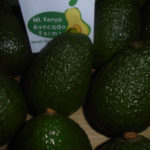 Kenya is a leading exporter of avocado in the region, having exported around KSH6.5 billion of the dried fruit at the end of 2016, a ten percent increment over the previous years’ figures. Despite struggling with the rising expenses of sea shipments, which make the country less competitive to other avocado suppliers like Chile and Peru, simple strategies are boosting the import potential of the fruit. They range from farm-based phytosanitary measures to Good Agricultural Practices (GAP) certifications.
Kenya is a leading exporter of avocado in the region, having exported around KSH6.5 billion of the dried fruit at the end of 2016, a ten percent increment over the previous years’ figures. Despite struggling with the rising expenses of sea shipments, which make the country less competitive to other avocado suppliers like Chile and Peru, simple strategies are boosting the import potential of the fruit. They range from farm-based phytosanitary measures to Good Agricultural Practices (GAP) certifications.
By June, 2017, an additional 294 smallholder farmers had registered with a dozen or so companies for GAP certificates. According to the Export Promotion Council (EPC), these certifications have improved the import value of avocados by 35 percent.
Another simple idea is the fact that farmers are keeping their production records from the planting period to the harvesting time. This is, in turn, boosting confidence of the end-consumers, both locally and abroad of availing high quality, safe and fresh produce. In fact, when the Kenya Plant Health Inspectorate (KePHIS) reviews such farmers’ records, it fastens the process of checking for the minimum residual levels. This in turn helps importers meet their groceries’ processing deadlines in their respective markets.
If you are seeking avocados, look no further than smallholder farming areas of Kenya. The leading places where avocado thrives in the country is dominated by family growers. The Central region, in counties such as Kirinyaga, Nyeri, Thika, Kiambu and Muranga, is such an example. There are also varieties from the Eastern parts of the country including Makueni and the market leader, Meru. The Western parts of the country where you can expect a bumper harvest of fresh avocados include Kisii, Trans Nzoia and Nyamira. The production levels in the key farming areas have also increased in recent years due to the emergence of new foreign markets such as the United Arab Emirates, Hong Kong ad Singapore.
Though the two main cultivars are hass alongside fuerte, there are also smaller quantities of Dyke, G6 and Puebla and Keitt varieties available. The biggest exports, are however, from fuerte and hass, whose markets include France, Britain, Germany and the Netherlands. South Africa is also seeking to bring back imports from Kenya. In the previous years before stopping imports, it was the highest African importer of avocados from the country, especially the hass variety.
Kenya farmers are taking advantage of such markets by making visible efforts to parade their fruits as attractive alternatives to those from Peru and Chile. This is taking place through strict phytosanitary methods. For instance, during the harvest of avocados, the farmers work together with supply chain experts who provide sanitary gloves, special cutting blades and washing apparatus. The picking of only the right fruits, also helps to guarantee that the fruits do not ripen too quickly when in the storage warehouses or en-route.
On top of that, KePHIS and the Horticulture Crops Directorate of the country carry out regulations that bar poor quality avocados from leaving the country. Through the new National Horticulture Tracing System (NTS), the country is now registering less rejects of its avocados abroad, as the fruits undergo monitoring throughout the post-harvesting processing, to ensure they have passed the international quality tests.
So, if you are seeking to prepare that guacamole meal in any part of the world, with the best, medium-sized avocados, then look no further than Kenya. At Mount Kenya Avocados, quality is our premise and we ensure consumers get a shipment that they will always seek again.

